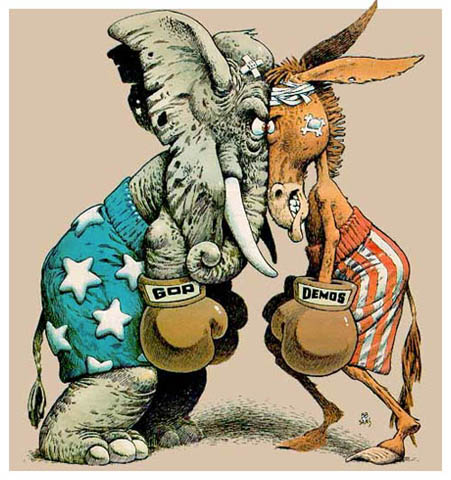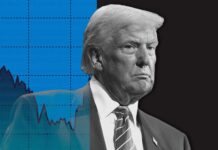Fun fact: you can be a justice of the U.S Supreme Court, so can anyone else on the planet, a dog, or even a rock. This is obviously a comical interpretation of the Constitution; a dog will never become a Supreme Court justice. The reason that all of the justices have been humans with some legal training is because a human with some legal training is the best choice for a position at the top of the judicial branch. The Constitution only describes the duties of the Supreme Court justices, says that they have to exist, and dictates how they are chosen; it never states any qualifications, or how many there need to be. People take things like Supreme Court justices for granted, assuming that the way things are today (9 justices, all over a certain age with law degrees) are required by the Constitution. Another thing people take for granted is the existence of political parties, but in no way are the Democrats, Republicans, or any other third party actually part of the government or in the Constitution. Of course, most of the U.S government is made up of people who are members of either the Democratic or Republican Party, but the parties themselves are their own entities. So why do we have them, even though George Washington warned against their “baneful effects” in his farewell address? Or an even better question: should we even have them?
The first question is simple enough to answer, just look at history. Though Washington condemned them, political parties have made some aspects of politics easier. It would be a lot harder to keep track of the candidates and the elections if everyone who is now vying for the Republican nomination ran by themselves come election time. Political parties are also a great thing for politicians. Parties allow them to get together with people with similar ideas and work together to pass laws that they think will help the country. Political parties also allow candidates to run in an election with a pre-made support base, funding, and national recognition. This makes campaigning much, much easier than trying to run on one’s own. For politicians trying to get elected to an office, political parties are beneficial. Throughout history, the politicians who have run under the banner of a party have had massive advantages; few people even know of the candidates who ran by themselves.
So if political parties do these things, then why did George Washington warn that the “spirit of parties” would “agitate the community with ill-founded jealousies”? Why are they so bad?
The people of the U.S must live with the consequences of political parties, two of which are major problems to the efficiency and effectiveness of a democracy: sharp party divisions within Congress, and psychological effects of parties on voters.
It is no secret that Congress is divided; with shutdowns, filibusters, and constant squabbling between the two sides, there is not much of an argument that says otherwise. This divide is created by the difference of opinions in Congress. Of course, having different opinions is not completely bad; it allows people to be exposed to different viewpoints on issues, helping them to make better-informed choices. A variety of ideas is essential, even unavoidable, in a country like the U.S, which is home to a very ethnically and socially diverse population. Listening to arguments from “the other side” helps one to find the flaws in their positions, and find the merits of their opponent’s arguments. When applied to making decisions, the differing viewpoints are usually combined into a compromise, as there are usually points made by “the other side” that one can agree with. Unfortunately, this idea of listening to the other side has been overtaken by vicious, destructive competition.
Political parties create the destructive competition that harms the nation. Congress is more divided now than it has ever been since the Civil War era, and “‘compromise’ has become a dirty word,” according to a Harvard Business Review article. A large, bipartisan majority passed the laws creating Medicare in 1965, but the Affordable Care Act barely made it through; not a single Republican voted for it. Since then, things have only escalated, with Congress threatening to shut down the government. In 2011, Congress just barely avoided a shutdown when a dispute over the debt limit was resolved just before the shutdown deadline, but some politicians said that a shutdown would be “less damaging than [a] compromise” (Harvard Business Review). In 2013, when faced with a budget proposal for the next fiscal year, rather than allow a clause that allowed funding for Obamacare (which was synonymous with “Democrat” at this point), Republicans opted to completely shut down the government. During this time, not only Congress shut down, but also most government-connected organizations. Businesses which rely on the government, such as military contractors, announced they would have to furlough (indefinitely lay off) workers if the government stayed shut down past October 7 (the shutdown lasted until October 17). The shutdown also affected many people who had government jobs which were deemed “nonessential,” (over 800,000, according to a US News article) who were also furloughed. Immigration aid, government funded shelters for the homeless and domestic violence victims, and programs for children faced potentially closure due to a lack of funds. National parks also shut down, which meant major revenue loss for businesses which rely on tourism, and the total losses to these communities was over $500 million (US News). The cost just to pay back the workers who were furloughed was $2 billion, which was paid by taxpayers (US News). These only scratch the surface of the losses brought by the shutdown. All of this happened because politicians decided that a shutdown would cause less damage than a compromise, showing their true loyalties; they are more loyal to a political party than to the very country which they promised to serve when they took their office. These are exactly the kind of divisions George Washington warned against.
Political parties also hinder the effectiveness of a democracy by creating dangerous party mentalities within voters and giving them shortcuts to making a decision. Voters make decisions based upon the party of the candidate instead of the candidate themselves. This may not mean basing one’s decision completely on the party (very few people do that), but party affiliation does influence decisions. According to research done by the University of Michigan, party affiliation (or leaning) colors a voter’s view of a candidate. One might hold the Republican candidate in slightly higher regard than the Democratic candidate before hearing what they have to say, due to their affiliation. This creates an initial bias towards the Republican, whether the voter realizes it or not, as “[one’s] own political power is diluted by a group,” according to John Johnson, a psychology professor at Penn State University. Most do not realize this, so they might unintentionally discredit what “the other side” has to say. These psychological effects prove to be a hindrance to the effectiveness of the Democratic process. The process works best when all voters are informed of the issues, and have carefully weighed the options put forth by the individual candidates, and make their own, independent decision based upon who they think would do the best job at running the country. This might take more time and work, but it would result in a government that would be decided based upon who the people of the United States genuinely think would lead the country in the right direction and serve the citizens to the best of their ability. However, people do not do this for one, simple reason: people are lazy. The psychological effects of parties give people shortcuts: Republicans stand for one thing and Democrats stand for another. This may be true for one or two issues and opinions of a candidate, but they could differ greatly from their party on issues that different voters find important. Rather than go look up the stances of each politician on each issue and weigh each candidate against each other on the issues, then see who they agree with the most, voters just look at the party and then they vote. Getting rid of political parties would almost force voters to be more informed and make well thought out decisions.
Without political parties, Congress would not be so divided, as members Congress of Congress would have to see what each other has to say, and then discuss issues seriously and with the intent to reach some sort of decision that they can all agree on. Without political parties, people would be better informed when making such weighty decisions as who to vote for president. Without political parties, the U.S could truly have a government of the people, by the people, and for the people.
Sources:
University of Michigan http://www.icpsr.umich.edu/icpsrweb/instructors/setups/notes/party-identification.jsp
Harvard Business Review “Fixing What’s Wrong with US Politics” https://hbr.org/2012/03/fixing-whats-wrong-with-us-politics
John Johnson “The Unsavory Psychology of Two-Party Politics” https://www.psychologytoday.com/blog/cui-bono/201209/the-unsavory-psychology-two-party-politics
US News “Federal Government Shutdown: Biggest News Stories of 2013” http://www.usnews.com/news/special-reports/articles/2013/12/20/federal-government-shutdown-best-of-2013
US News “Budget office: Shutdown cost 6.6 million work days” http://www.usnews.com/news/politics/articles/2013/11/07/budget-office-shutdown-cost-66-million-work-days






